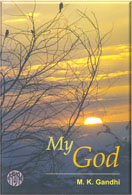
P.O. SEVAGRAM, DIST.WARDHA 442102, MS, INDIA. Phone: 91-7152-284753
FOUNDED BY MAHATMA GANDHI IN 1936
MY GOD

MY GOD
Table of Contents
- Meaning of God
- Reality of God
- Nature of God
- Truth is God
- Ahimsa - Unseen Power of God
- Faith and Reason
- Realization of God
- Prayers to God
- Voice of God
- Laws of God
- God and Evil
- Visitations of God
- Pathways to God
- Service of God
- The True Devotee
- 'Houses of God'
- Incarnations of God
- What God Has Meant To Me
About This Book
Written by : M. K. Gandhi
First Edition :5,000 copies, 1962
Total : 45,000 copies
ISBN : 81-7229-068-3
Printed and Published by : Jitendra T. Desai
Navajivan Mudranalaya,
Ahemadabad-380014
India
©Navajivan Trust, 1962
Download
Chapter 17 : Incarnations of God
In Hinduism, incarnation is ascribed to one who has performed some extraordinary service of mankind. All embodied life is in reality an incarnation of God, but it is not usual to consider every living being an incarnation. Future generations pay this homage to one who in his own generation, has been extraordinarily religious in his conduct. I can see nothing wrong in the procedure; it takes nothing from God’s greatness, and there is no violence done to truth. There is an Urdu saying which means ‘Adam is not God but he is a spark of the Divine!’ And therefore he who is the most religiously behaved has most of the divine spark in him. It is in accordance with this train of thought that Krishna enjoys, in Hinduism, the status of the most perfect incarnation.
This belief in incarnation is a testimony of man’s lofty spiritual ambition. Man is not at peace with himself till he has become like unto God. The endeavour to reach this state is the supreme, the only ambition worth having. And this is self- realization.
Young India, 6-8-1931, pp. 205-06
I have no knowledge that the Krishna of Mahabharat ever lived. My Krishna has nothing to do with any historical person. I would refuse to bow my head to the Krishna who would kill because his pride is hurt, or the Krishna whom the non Hindus portray as a dissolute youth. I believe in Krishna of my imagination as a perfect incarnation, spotless in every sense of the word, the inspirer of the Gita and the inspirer of the lives of millions of human beings. But if it was proved to me that the Mahabharata is history in the same sense that modern historical books are, that every word of the Mahabharata is authentic and the Krishna of the Mahabharata actually did some of the acts attributed to him, even at the risk of being banished from the Hindu fold I should not hesitate to reject that Krishna as God incarnate. But to me the Mahabharata is a profoundly religious book, largely allegorical, in no way meant to be a historical record. It is the description of the eternal duel going on within ourselves, given so vividly as to make us think for the time being that the deeds described therein were actually done by the human beings. Nor do I regard the Mahabharata as we have it now as a faultless copy of the original. On the contrary I consider that it has undergone many emendations.
Young India, 1-10-1925, p. 336
God is not a person. To affirm that He descends to earth every now and again in the form of a human being is a partial truth which merely signifies that such a person lives near to God. Inasmuch as God is omnipresent, He dwells within every human being and all may, therefore, be said to be incarnations of Him. But this leads us nowhere. Rama, Krishna, etc. are called incarnations of God because we attribute divine qualities to them. In truth they are creations of man’s imagination. Whether they actually lived or not does not affect the picture of them in men’s minds. The Rama and Krishna of history often present difficulties which have to be overcome by all manner of arguments.
The truth is that God is the force. He is the essence of life. He is pure and undefiled consciousness. He is eternal. And yet, strangely enough, all are not able to derive either benefit from or shelter in the all-pervading living presence.
Electricity is a powerful force. Not all can benefit from it. It can only be produced by following certain laws. It is a lifeless force. Man can utilize it if he labours hard enough to acquire the knowledge of its laws.
The living force which we call God can similarly be found if we know and follow His law leading to the discovery of Him in us.
Harijan, 22-6-1947, p. 200